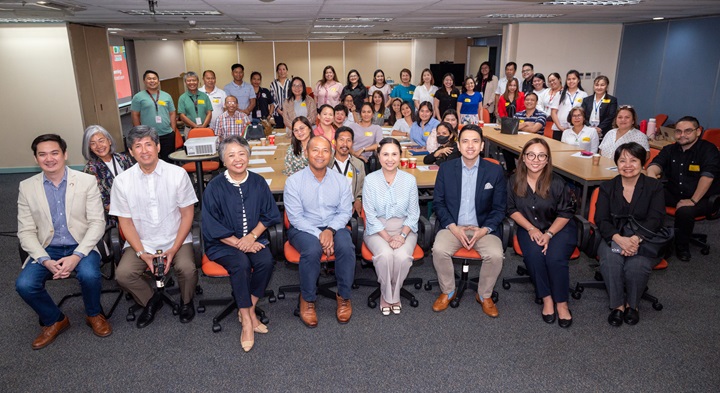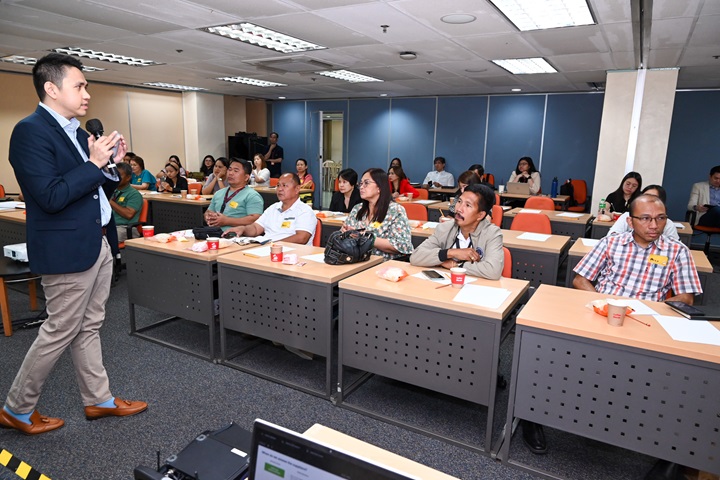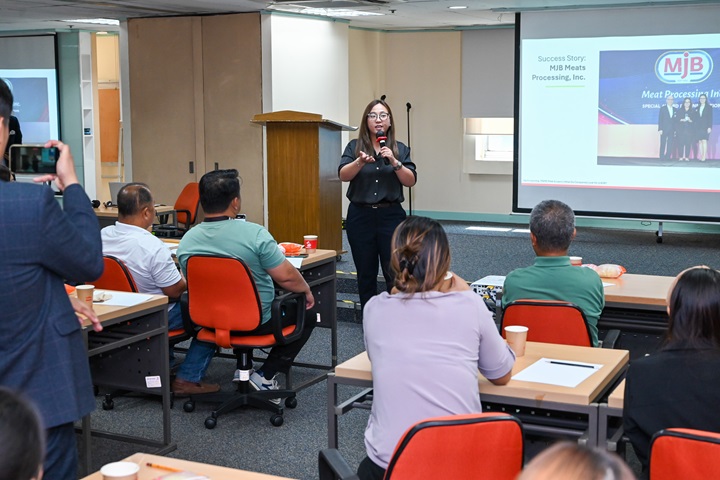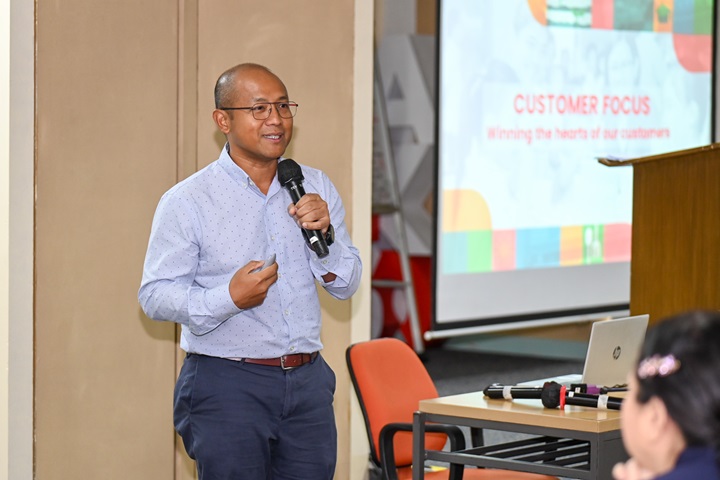
marketing expertise with the MSMEs as part of its partnership with the Department of Trade and Industry
(DTI) in mentoring entrepreneurs in the country. Joining DTI Undersecretary Ma. Cristina Roque (first
row: middle in light blue) in the photo are leaders from JFC (L-R, first row) Steve Piczon, Assistance Vice
President , Government Affairs; Atty. Raul Academia, Vice President and Public Affairs Head; Gisela
Tiongson, President, Jollibee Group Foundation; Kenneth Lingan, President, Chowking Philippines; Bryan
Tividad, JFC’s Assistant Vice President and Head of Global Procurement Services; Joanna Ignacio, MJB
Meat Processing Inc.’s Procurement Head; and Marievic Bonoan, DTI’s Director for Bureau of Market
Development Promotions, and OTOP Office.
Over 30 micro, small, and medium enterprise (MSMEs) entrepreneurs benefitted from the learning session recently organized by the Jollibee Foods Corporation (JFC) and its social development arm Jollibee Group Foundation (JGF) in partnership with the Department of Trade and Industry (DTI). The first learning session, which supports the Republic Act 9501, centers on capacity building and knowledge sharing that aims to enhance MSMEs’ business and marketing skills to enable them to scale their businesses.
DTI Undersecretary Ma. Cristina Roque was present during the learning session entitled “Joy in Learning: MSME Meet and Learn,” which discussed the company’s Farmer Entrepreneurship Program under JGF and the Company’s practices in conducting Business-to-Business (B2B) and Business-to-Consumer (B2C) engagements.
“I began my entrepreneurial journey 30 years ago with a mere capital of P6,000, a prayer, and a dream. Once in my lifetime, someone has opened the door for me, and I realized that I, too, should open the door for others. I hope that through these learning sessions, the MSMEs will have a different mindset and open their eyes to the possibilities. Remember, not so long ago, Jollibee was an MSME, too,” said Usec. Roque.
DTI recently signed a memorandum of understanding (MOU) with the JFC and JGF to help MSMEs grow through capacity building and knowledge sharing. The partnership supports Republic Act 9501, also known as the Magna Carta for MSMEs, which aims to promote MSME growth by expanding entrepreneurship training programs, fostering linkages between large and small enterprises, and encouraging private sector engagements.
“We are truly grateful for the support of DTI in our goal of enriching the lives of MSMEs in the country. By sharing our expertise and experiences, we hope to inspire and empower these entrepreneurs to dream bigger and succeed in their businesses,” said JFC President and Chief Executive Officer Ernesto Tanmantiong.
FEP engagement
JGF’s President Gisela Tiongson opened the learning session by discussing how institutional markets like JFC established relationships with MSMEs and highlighting the Foundation’s experience in linking smallholder farmers as suppliers to the Company.
Launched in 2008, the Farmer Entrepreneurship Program (FEP) organizes and transforms small-scale farmers into agro-entrepreneurs. With the help of its partners and stakeholders from various sectors across the country, the Foundation has helped farmers sharpen their technical and business acumen and link them with institutional markets such as the JFC for increased and steady income.
“Through the shared knowledge and hard work of our teams, partners, and stakeholders, FEP farmers could innovate their practices, understand the importance of calculated risks, and aim for bigger goals for themselves and their businesses. Apart from capacitating them as agro-entrepreneurs, the opportunity empowers them to have a sustainable livelihood and uplift their lives and communities,” Tiongson said.
Stakeholder engagement
Aside from the farmers, the session also allowed the MSMEs to discover the different options and considerations for business development for B2B and B2C engagements.

provided an overview of the company’s Procurement Value Matrix, which expounds buyers’ decision
points. This allowed the attendees to understand the key criteria of institutional markets before
onboarding suppliers.
JFC’s Assistant Vice President and Head of Global Procurement Services Bryan Tividad provided an overview of JFC’s Procurement Value Matrix, which expounds buyers’ decision points. The session also allowed the attendees to understand the key criteria of institutional markets before onboarding suppliers.
“While it may seem daunting, we wanted to give our MSMEs inspiration that it is doable and that there are B2B opportunities for them. We hope that through this session, they can learn the expectations and validations that companies like the JFC require from their suppliers. How they can prepare their businesses for effective and successful B2B transactions,” Tividad added.
Cited as an example is MJB Meat Processing Inc., one of the JFC’s longtime suppliers since 2008. One thing that Joanna Ignacio, the Procurement Head of MJB Meat Processing Inc., did not expect is that their once small family business, with the family members being the employees themselves, would eventually venture into supplying an institutional partner like the JFC.
Being part of their family business meant growing with the company and learning along the way. According to Ignacio, one thing that inspired them to really work hard is how their parents triumphed over all the challenges with a positive mindset.
“They always told us: ‘You should be ready to take on all the challenges coming your way.’ And I’m happy that we took that advice to heart because that led us to where our company is today,” she said.
MJB produces processed meat products such as bacon, ham, and longanisa. As a trusted supplier, MJB understands the Company’s customer values and performs against high standards, establishing its capability and credibility.

Processing Inc., did not expect is that their once small family business, with the family members being the
employees themselves, would eventually venture into supplying an institutional partner like the JFC.
“JFC has guided and helped us overcome the initial hesitations and challenges of scaling our business. With constant and open communication regarding expectations and capacity, we learned how to be flexible and reliable enough to meet their requirements, particularly on food safety compliance–which also benefits our retail brand today,” Joanna Ignacio, Procurement Head of MJB Meat Processing Inc. said.

Consumer (B2C) while underscoring customer focus as its core value.
Meanwhile, Chowking President Kenneth Lingan tackled the ins and outs of Business-to-Consumer (B2C) while underscoring customer focus as its core value.
According to him, winning the hearts of customers helps build the consumer’s relationship with the brand. Sharing how they put customer focus into action in Chowking, Lingan highlighted that they identify their target market, establish a Unique Selling Proposition (USP), and execute the Marketing Mix Strategy, which focuses on Product, Price, Place, and Promotion, or 4Ps.
JFC is looking forward to more collaborations with DTI as it continues to play an active role in uplifting the lives of more Filipinos, including MSMEs.

